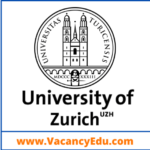Stockholm University, Sweden invites online Application for number of Fully Funded PhD Degree at various Departments. We are providing a list of Fully Funded PhD Programs available at Stockholm University, Sweden.
Eligible candidate may Apply as soon as possible.
(01) PhD Degree – Fully Funded
PhD position summary/title: PhD student in Computer and Systems Sciences, with focus on Enterprise Architecture and Digital Transformation
As a PhD student, you will collaborate with researchers at the Information Systems unit at DSV to tackle the challenges of aligning IT infrastructure with evolving business strategies through the lens of Enterprise Architecture (EA) in the context of digital transformation. The research centers on the application of simulation models to analyze the impact of legacy decisions on current IT and business processes. By adapting existing tools to simulate various scenarios within an EA framework, the project aims to identify and quantify obstacles to organizational agility and efficiency. The ultimate goal is to provide actionable insights and support decision-making for better alignment of IT with business objectives, enhancing the strategic planning and operational performance of organizations. The research focus will be discussed regularly and decided jointly by the supervisors, the PhD student, and the research group to explore relevant areas within enterprise architecture.
The project is part of a vibrant academic community with a strong international network, offering opportunities for interdisciplinary collaboration, seminars, and scientific exchange within both academia and industry. In addition to a competitive salary and wellness benefits, the candidate is offered strong support for academic development, including funding for books, conference travel, and professional growth opportunities.
Deadline : 15.Oct.2025
(02) PhD Degree – Fully Funded
PhD position summary/title: PhD student in Metamorphic petrology
This PhD project aims to reconstruct the behavior of the fluids in the crust during the formation of a mountain belt. To achieve this, the project will integrate quantitative analyses of metamorphic rocks—including metapelites, calcsilicates and marbles—with petrological and geochemical constraints.
The successful candidate will have the opportunity to conduct fieldwork in the Scandinavian Caledonides and work with rock samples from a drill core (COSC-1) from Jämtland (Sweden) recovered by the International Continental Drilling program in 2014.
As part of this four-year project, you will receive training in thermodynamic modelling and microanalytical techniques (scanning electron microscope, electron microprobe, laser ablation inductively coupled plasma mass spectrometry) to reconstruct the mass of fluids released by metamorphic reactions during mountain building processes. The project will be based at Stockholm University and is supported by a network of national and international collaborators.
Deadline : 08.Sep.2025
View All Fully Funded PhD Positions Click Here
(03) PhD Degree – Fully Funded
PhD position summary/title: PhD student in Criminology
The Department of Criminology at Stockholm University announces two to three PhD student positions. The thesis work will be conducted within the framework of criminology. We offer all our doctoral students a workplace at the department and require attendance and active participation in our research environment. On our website you can find more information about our postgraduate education and coursers.
Deadline : 01.Sep.2025
(04) PhD Degree – Fully Funded
PhD position summary/title: PhD student in Neurochemistry with molecular neurobiology
Project title: “Fe65 and its interaction partners in neuronal function and neurodegeneration”.
This PhD student position is in the research team of Associate Professor Anna-Lena Ström. The team seeks to understand the molecular mechanisms underlying neurodegenerative disorders (NDs), such as the polyglutamine disease spinocerebellar ataxia type 7 (SCA7), amyotrophic lateral sclerosis (ALS), and Alzheimer’s disease (AD).
Accumulation and aggregation of various disease-related proteins, increased levels of DNA damage, and altered gene expression are common hallmarks of many NDs. We have previously shown that the expression level of the brain-enriched scaffold protein Fe65 increases in response to DNA damage and that the nuclear translocation of this protein is involved in DNA repair. Interestingly, Fe65 can interact with both the amyloid precursor protein (APP) and tau—two proteins linked to the pathology of AD. Moreover, tau dysregulation, including tau nuclear translocation, has been implicated in several other NDs, such as ALS. However, exactly how Fe65, via its multiple interaction domains, forms different protein complexes involved in distinct essential cellular functions—such as DNA repair and gene regulation—and how complex formation is regulated spatially and temporally remain largely unstudied. Moreover, the molecular mechanisms by which distinct Fe65 complexes execute context-specific functions and how these processes may be disrupted in different NDs are unclear. The aim of this project is to address these questions using various cell models, including patient fibroblasts and induced pluripotent stem cell (iPSC)-derived neurons, in combination with CRISPR/Cas-mediated genome editing, molecular biology and biochemical techniques, as well as advanced confocal fluorescence microscopy
Deadline : 20.Aug.2025
(05) PhD Degree – Fully Funded
PhD position summary/title: PhD student in Bioinformatics
Your studies in Bioinformatics will be in the project: “Using Deep Learning to Understand Protein Structure Evolution”.
We have studied domain evolution and observed that structural change is roughly linear with sequence change. However, larger structural changes might also occur within a domain during evolution, particularly within transporters3. Further, domains can be combined to create multi-domain proteins. Most domain architectures arise from adding or removing a single domain at the N- or C-terminal regions, while certain repeat-domain families undergo more internal duplications. We also demonstrated that eukaryotic proteins harbour substantially more disordered and linker regions, which expand more rapidly than globular domains. Most phylogenetic studies of proteins, including ours, have primarily focused on changes in the amino-acid sequences. Today, accurate structural models from AlphaFold make it possible to integrate structure into large-scale phylogenetic and sequence analyses. Therefore, in this application, we propose revisiting earlier studies, scaling them up, and adding structural information to the analysis. This study will provide a detailed structural understanding of changes within domains, how novel protein architectures emerge, and why certain domains and architectures continue expanding and diversifying in specific lineages. We believe this study will provide fundamental insights into protein structure evolution and how evolutionary mechanisms and selective pressures have shaped proteins. Together, the three aims of this project will reveal how domain changes their structure and how rearrangements shape structural protein diversity across the tree of life.
The Elofsson group is located at the Science for Life Laboratory. Elofsson has worked on protein structure predictions and evolution for over two decades. He has worked on various techniques using machine learning and other computational techniques. Our most important contributions to this work are the methods he has developed to identify the quality of protein models, Pcons, and various versions of ProQ. The group comprises 5 PhD students, one postdoc, and one senior researcher.
Deadline : 20.Aug.2025
Polite Follow-Up Email to Professor : When and How You should Write
Click here to know “How to write a Postdoc Job Application or Email”
(06) PhD Degree – Fully Funded
PhD position summary/title: PhD student in Analytical Chemistry in luminescent nanoprobes for in vivo bioimaging
The PhD student will work in the Research Group of Associate Professor Georgios A. Sotiriou (https://sotirioulab.org) located at the Department of Chemistry and Science for Life Laboratory (SciLifeLab). The co-supervisor is Professor Jerker Widengren from KTH Stockholm.
Subject area: Analytical Chemistry
Project title: Luminescent nanoaggregates as bioimaging probes.
Project description: Luminescent nanoparticle may serve as bioimaging probes to study their distribution in vivo in animal studies. This imaging is crucial during the development of nanoparticle based therapies. In this project, we will utilize the potential of flame aerosol nanoparticle synthesis to produce a variety of luminescent nanoparticles active in the near-IR. We will control their optical properties to maximise their detection in vivo, and we will also tune their surface properties to render them suitable for biofunctionalization. We will aim to target specific organs by specific biofunctionalization strategies. The project includes:
- Production of nanoparticles by flame aerosol synthesis
- Physicochemical characterization of nanoparticles
- Optimization of nanoparticle composition and size for near-IR luminescence and setting up optical system for measuring performance
- Establishing biofunctionalization strategies for specific targeting cells and assessment in vitro in cell cultures
- Ex vivo and in vivo assessment of performance for bioimaging.
Deadline : 15.Aug.2025
(07) PhD Degree – Fully Funded
PhD position summary/title: PhD student in Analytical Chemistry in advanced robust biochemical sensors
The PhD student will work in the Research Group of Associate Professor Georgios A. Sotiriou (https://sotirioulab.org) located at the Department of Chemistry and Science for Life Laboratory (SciLifeLab). The co-supervisor is Professor Nicole Pamme from the same Department at Stockholm University.
Subject area: Analytical Chemistry
Project title: Paper-based diagnostics with optically active nanoparticles.
Project description: Paper-based diagnostics exhibit great potential for environmental and health sciences applications. In this project, the doctoral candidate will directly deposit optically active nanoparticles on filter papers by flame aerosol direct deposition and utilize them for point-of-care diagnostics in biomedicine (e.g. to detect bacterial presence in biological fluids), and for environmental applications, for example to detect the presence of pesticides in agricultural products. The project includes:
- Production of nanoparticles by flame aerosol synthesis
- Physicochemical characterization of nanoparticles
- Deposition of nanoparticles on paper substrates and their characterization
- Establishing structure-function relations to understand the sensing capabilities of optically active nanoparticles.
- Assess their performance in detecting bacterial presence and/or toxic substances.
Deadline : 15.Aug.2025
(08) PhD Degree – Fully Funded
PhD position summary/title: PhD student in Materials Chemistry
Project title: Catalytic conversion of CO2 into polymers in a sustainable way
Supervisors: Prof. Jiayin Yuan from Stockholm University (main supevisor); Asso. Prof. Bacsik Zoltán from University of Miskolc in Hungary (co-supervisor)
The project deals with the CO2 utilization through the catalytic conversion of CO2 into polymers in one step or multisteps. The type of the catalysts, and the catalytic mechanism, and the optimization of the catalytic conditions will be systematically investigated. Both high selectivity and yields are important. Polymers of our interest are primarily polycarbonates, and other polymers can be included.
Deadline : 15.Aug.2025
Click here to know “How to Write an Effective Cover Letter”
(09) PhD Degree – Fully Funded
PhD position summary/title: PhD student in Materials Chemistry for Sustainable Organic Semiconductors
Project title: Organic semiconductor–insulator blends for scalable organic electrochemical transistors
Supervisors: Assist. Prof. Erica Zeglio (main supevisor); Prof. Mahiar Max Hamedi (co-supervisor)
Organic semiconductors offer a promising route toward more sustainable electronics, especially for short-lived applications such as wearable health monitors, environmental sensors, and intelligent packaging. However, their widespread adoption is currently limited by synthetic complexity, high material costs, and environmental impact.
This project explores blends of organic semiconductors and insulating polymers to address these challenges. By integrating insulating polymers, we aim to lower the carbon footprint, improve processing scalability, and maintain or enhance the electronic performance of the active layer.
The project builds on our recent results showing that high-performance can be achieved with a significantly reduced fraction of the organic semiconductor. This approach enables more sustainable processing and supports the development of low-cost, sustainable materials for printed organic electrochemical transistors (OECTs) and electrochemical sensors.
The research environment provides access to advanced infrastructure and interdisciplinary expertise spanning materials chemistry, polymer science, bioelectronics, and green processing. The selected candidate will gain hands-on experience in sustainable materials design, thin film and device fabrication, and performance evaluation of bioelectronic materials and devices thereof.
We are looking for a curious and motivated candidate with a strong interest in sustainable materials for organic electronics. The ideal applicant will have a problem-solving mindset and a will be eager to work across fields such as materials chemistry, electrochemistry, and device physics. Candidates with a background in materials chemistry, materials science, polymer science, organic electronics, or related disciplines are particularly encouraged to apply. A strong command of written and spoken English is required.
Deadline : 15.Aug.2025
(10) PhD Degree – Fully Funded
PhD position summary/title: PhD student in Arctic Aeolian Processes and Paleoclimate
This PhD project aims to understand the connections between aeolian processes, carbon accumulation and fires in Arctic Fennoscandinavia. Although cool and wet climates are often overlooked in mineral dust research, the presence of loess and sand dune systems in these regions highlights the existence of dust dynamics even at high latitudes. Dust plays a complex role in the Earth’s climate and is an important pathway for nutrient transport, and thereby, ecosystem productivity. Climate change in the Arctic is occurring at a much faster rate than elsewhere on Earth, and fires are expected to increase in frequency – this enhances aeolian activity and dust production. The consequence of this on northern peatlands, which currently store a third of the world’s soil carbon, is at present uncertain. This project will integrate elemental and mineralogical information from mid-Holocene aged peat-based paleorecords with proximal loess and sand dune records to examine changes in dust (source and quantity), fire activity and any consequent changes in carbon and peat accumulation rates in the surrounding peatlands.
The successful candidate will work with different types of glacigenic sediments as well as peat sequences. This will involve several field campaigns in northern Fennoscandinavia. As part of this four-year project, you will receive training on a range of geochemical methods from sample preparation and clean room procedures to mass spectrometric and scanning electron microscope techniques. Macrofossil analyses are also planned.
Deadline : 15.Aug.2025
Connect with Us for Latest Job updates
(11) PhD Degree – Fully Funded
PhD position summary/title: PhD student in Molecular Biosciences
We are actively seeking a highly motivated candidate with a passion for developing experimental methods to join our team. In this role, you will be involved in a groundbreaking project aimed at studying protein interactions in cells and tissues, making use of the expertise of the Piazza lab. With proof-of-concept already established, you will work to refine and optimize the method to achieve broad applicability and high reproducibility. You will have the opportunity to apply this novel approach to explore pressing biomedical questions and leveraging this knowledge to advance treatments for human tumors and immunotherapies.
The Piazza laboratory (Piazza Lab) uses mass spectrometry-based approaches to study protein interactions in cell and tissues with proteomics. In this project you will learn experimental and computational approaches to tackle fundamental biological questions with medical relevance using innovative system-wide techniques. You will work on an exciting multidisciplinary project integrating multiomics approaches that aims to understand how metabolism and metabolic enzymes control chromatin in bulk and at single cell level. You will have access to state-of-the-art instrumentation at the SciLifeLab laboratories in Solna and be involved in international cross-disciplinary collaborations.
Deadline : 15.Aug.2025
Polite Follow-Up Email to Professor : When and How You should Write
(12) PhD Degree – Fully Funded
PhD position summary/title: PhD student in Environmental Science, Stem Cell-Based Models and Toxicology
Neurotoxicity, and in particular developmental neurotoxicity (DNT), poses a significant public health concern due to its potential to cause long-lasting effects on brain function and behavior. There is a growing need for human-relevant, mechanistically informed models to improve the assessment of neurotoxic risks.
The PhD position is fully funded for 4 years and will be carried out in Oskar Karlsson’s group at SciLifeLab. The project aims to develop and apply advanced in vitro models for studying neurotoxicity using human induced pluripotent stem cells (hiPSCs). A central focus will be on differentiating hiPSCs into neural lineages and generating 3D brain organoids to better mimic key aspects of human neurodevelopment.
We will combine these models with high-content screening and omics-based approaches (e.g., DNA methylome sequencing and transcriptomics), including single-cell analysis, to investigate the molecular mechanisms underlying neurotoxic effects. The goal is to identify early biomarkers of DNT, map adverse outcome pathways, and improve the predictive capacity for human health risk assessment.
Deadline : 04.Aug.2025
(13) PhD Degree – Fully Funded
PhD position summary/title: PhD student in Environmental Science: non-target PFAS screening by GC-HRMS
The thesis work will be carried out as part of the FORMAS-funded project “Identification and Characterization of ‘Lipophilic’ Fluorinated Organics in the Blubber of Marine Mammals (IDing-LFOs)”. This project challenges the prevailing assumption that PFAS bioaccumulation is primarily driven by protein binding. Building on our initial discovery of novel PFAS in marine mammal blubber, we will apply advanced gas chromatography–atmospheric pressure chemical ionization–ion mobility mass spectrometry (GC-APCI-IMS) to further identify and characterize compounds within this class. Subsequently, we will investigate their environmental occurrence and assess temporal trends in wildlife. Finally, we will compare the biological activity of these lipophilic organofluorines to that of conventional, protein-binding PFAS by examining their interactions with nuclear receptors.
Deadline : 04.Aug.2025
(14) PhD Degree – Fully Funded
PhD position summary/title: PhD student in Bioinformatics
At the Department of Biochemistry and Biophysics at Stockholm University, we are announcing a position as DDLS PhD student in Data driven cell and molecular biology. Data driven cell and molecular biology covers research that fundamentally transforms our knowledge about how cells function by peering into their molecular components in time and space, from single molecules to native tissue environments.
Your studies in Bioinformatics will be in the project “Quantitative predictions of protein – DNA interactions from high-throughput biophysical binding data”.
Sequence specific binding and recognition between transcription factors and DNA control gene expression at the molecular level. While structural predictions using deep learning methods like AlphaFold have revolutionized our understanding of sequence dependent molecular structure, we currently have much more limited understanding of how the genetic code specifies binding rates and affinities for interacting molecules. Despite the significance of these interactions, quantitatively predicting binding from nucleotide or protein sequences still remains a challenge. The research group of Emil Marklund investigates how sequence information in biological macromolecules governs recognition, binding, and dynamical structure. This project aims to build predictive and physical binding models of protein – DNA interactions using high-throughput and quantitative biochemical binding data across hundreds of thousands of sequence variants.
Deadline : 31.Jul.2025
(15) PhD Degree – Fully Funded
PhD position summary/title: PhD student in Plant Physiology
The proposed PhD student position is available in the laboratory headed by Professor Edouard Pesquet. The project addresses the cellular and molecular mechanisms controlling the spatio-temporal accumulation of specific lignin chemistries in the cell walls of plants. Functional genetics in whole plants and inducible pluripotent cell cultures are combined with bulk and spatial biochemistry to study the links between specific lignin topochemistries and their biophysical functions in plant cells and tissues. Focus during this PhD will be set on understanding the role, regulation, localization, evolution and activation of lignin oxidizing enzymes. The importance of cell specific lignin topochemistries for adjusting plant physiology and growth will also be investigated in response to environmental constraints. You can read more about the research in Prof. Pesquet’s group here: Edouard Pesquet – Stockholm University.
Deadline : 31.Jul.2025
(16) PhD Degree – Fully Funded
PhD position summary/title: PhD student in Molecular Biosciences
This PhD student position is available in the laboratory headed by Associate Professor Qiaolin Deng. The project aims to addresses the molecular mechanisms underlying the intergenerational effects of maternal endocrine diseases in cardiomeatabolic health in offspring. We focus on the human placental development in disease, and their developmental programming effects mediated by tissue-tissue communication. Multiomic single-cell techinique such as RNAseq, ATACseq and spatial transcriptomics will be applied on human placentas from endocrine diseases including diabetes and polycystic ovary syndrome to understand common and specific disease signatures. More importantly, microfluidic co-culture of placental organoids with metabolic tissue organoids (i.e. liver, heart, brain) will be established to investigate the molecular mechanisms of developmental programming effects in human with focus on secretome, mitochondrial function and steroidogenesis to reveal sex dimorphic effects.
Deadline : 31.Jul.2025
(17) PhD Degree – Fully Funded
PhD position summary/title: PhD student in Biochemistry
Your studies in Biochemistry will be in the project: “Structural and functional studies of biomedical relevant protein complexes using cryo-EM”.
The project aims to use cryo-EM in different technical variants as a method to address questions about the molecular mechanism behind certain autoimmune and other diseases.
The PhD student will learn to purify antibodies and fab fragments from patient or animal model sera, will clone, express and purify antigen proteins using bacterial and eukaryotic systems, prepare specimens for cryo-EM, operate the electron microscope in different modalities and determine and analyse structures of molecular complexes. Additionally, the student will also learn bioinformatic tools for protein complex structure prediction and design. The PhD student will work also in close collaboration with national and international immunology and medical groups. The PhD student will be able to develop and test research hypothesis about structure and function of protein complexes involved in diseases and their treatment at the molecular level. The technical and theoretical knowledge that the student will acquire will be useful for future work possibilities in both the research and biotechnological/industry work environments.
The PhD student will work closely with two senior postdocs and two PhD student as well as with members of the Cryo-EM Facility at SciLifeLab (Stockholm, Sweden). The student will have access to two Titan Krios (equipped with Gatan Bioquantum-K3 cameras and CetaD for electron diffraction), one Talos Arctica (Falcon 3 and K2) and computational resources. SciLifeLab offers access to a number of other facilities such as super-resolution fluorescence microscopy, compound screening, NMR and structural mass spectrometry offering numerous possibilities to learn, explore cutting edge techniques, and to collaborate with different experts
Deadline : 22.Jul.2025
(18) PhD Degree – Fully Funded
PhD position summary/title: PhD student in Biophysics
Your studies in Biophysics will be in the project: “Experimental investigation of the structure and function of asymmetric membranes”.
Lipid bilayers are ubiquitous and functional biological interfaces. Extensive research has revealed how lipid chemistry affects the physical properties of bilayers with two compositionally identical leaflets. However, cells tune the properties of their membranes not only by making different types of lipids but also by regulating how these lipids are distributed between the two membrane leaflets. Mammalian plasma membranes, for example, have leaflets that can differ in both lipid composition and overall lipid abundance. How these two types of asymmetries affect bilayer properties and protein-membrane interactions is very poorly understood, yet critical for elucidating the functional roles of lipid organization in cells.
The goal of this project is to examine the molecular mechanisms underlying the effects of interleaflet asymmetry on membrane biophysical properties. A central part of the project will be the development of experimental protocols for detecting and quantifying lipid imbalances between the two leaflets in model liposomes, which is needed to fully characterize their asymmetry in vitro. This will be achieved with single-particle techniques based on e.g. cryogenic electron microscopy, Raman spectroscopy and fluorescence. Bilayer properties will be measured with techniques including fluorescence microscopy, NMR and small-angle neutron and X-ray scattering. The work will involve both performing the experiments and analyzing the collected data with appropriate computational tools and models.
A second part of the project will be focused on characterizing the effects of asymmetry on protein-membrane interactions in both model and biological membranes. The work may thus involve protein purification, liposome reconstitution and cell culture and experimentation. Both parts of the project will include close collaboration with other lab members and external collaborators. Generated hypotheses will be tested in vitro but also with computational simulations, which can be either self-implemented or conducted in collaboration with other researchers.
Deadline :22.Jul.2025
(19) PhD Degree – Fully Funded
PhD position summary/title: PhD student in Biophysics
Your studies in Biophysics will be in the project: “Computational biophysics of asymmetric membranes”.
Lipid bilayers are ubiquitous and functional biological interfaces. Extensive research has revealed how lipid chemistry affects the physical properties of bilayers with two compositionally identical leaflets. However, cells tune the properties of their membranes not only by making different types of lipids but also by regulating how these lipids are distributed between the two membrane leaflets. As a result, biological membranes can have leaflets that differ in both lipid composition and overall lipid abundance. How these two types of asymmetries affect bilayer properties and protein-membrane interactions is very poorly understood, yet critical for elucidating the functional roles of lipid organization in cells.
The goal of this project is to uncover the fundamental mechanisms underlying the effects of interleaflet asymmetry on membrane biophysical properties. This will be achieved by using molecular dynamics simulations to analyze the dynamics of atomistic membrane models with systematically varied composition and degree of asymmetry, as well as their interactions with membrane proteins. The simulations will be run with conventional software packages while analysis will involve both application of existing tools and development of new methods. The work will be heavily based on the ability to code, learn and implement various approaches (including machine learning pipelines), think critically and pay close attention to detail. It will also include frequent interactions with experimental collaborators in and outside of the lab to validate the computational results and test hypotheses generated either in vitro or in silico.
Deadline : 22.Jul.2025
How to increase Brain Power – Secrets of Brain Unlocked
About Stockholm University, Sweden – Official Website
Stockholm University is a public university in Stockholm, Sweden, founded as a college in 1878, with university status since 1960. With over 33,000 students at four different faculties: law, humanities, social sciences, and natural sciences, it is one of the largest universities in Scandinavia. The institution is regarded as one of the top 100 universities in the world by the Academic Ranking of World Universities (ARWU).
Stockholm University was granted university status in 1960, making it the fourth oldest Swedish university. As with other public universities in Sweden, Stockholm University’s mission includes teaching and research anchored in society at large.
Disclaimer: We try to ensure that the information we post on VacancyEdu.com is accurate. However, despite our best efforts, some of the content may contain errors. You can trust us, but please conduct your own checks too.
Related Posts
- 12 PhD Positions-Fully Funded at Linkoping University, Sweden

- 11 PhD Positions-Fully Funded at Maastricht University, Netherlands

- 07 PhD Positions-Fully Funded at University of Basel, Switzerland

- 11 PhD Positions-Fully Funded at University of Southern Denmark, Denmark

- 18 PhD Positions-Fully Funded at Inria, France

- 10 PhD Positions-Fully Funded at University of Stavanger, Norway

- PhD Positions (16)-Fully Funded at University of Zurich, Switzerland

- PhD Positions (08)-Fully Funded at University of Bergen, Bergen, Norway

- PhD Positions (05)-Fully Funded at Wageningen University & Research, Netherlands











